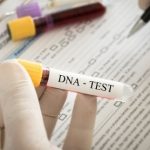A blood test that can determine the gender and genetic abnormalities in a unborn baby as early as five weeks has proven to be successful according to Dutch researchers. The researchers claim that the test has almost 100 per cent accuracy in determining the fetus’s gender.
The blood test uses the mother’s plasma to extract Genetic information about their unborn baby. The test can be used to determine if the unborn baby carries specific genetic abnormalities, such as muscular dystrophy, this test can be conducted shortly after conception.
Currently, testing for genetic abnormalities and gender cannot be carried out until at least 9 weeks and as late as 24 weeks. The current methods of testing are either through a Chorionic Villus Sampling (CVS) or an Amniocentesis.
Chorionic Villus Sampling (CVS) is a medical procedure conducted by an OBGYN that is typically performed between 9 – 13 weeks gestational age, which is often mistakenly referred to Chronic Villus (or Villi) Sampling. CVS is a vaginal procedure that removes a very small portion of the placenta.
Amniocentesis is a medical procedure conducted by an OBGYN that is typically performed between 14 – 24 weeks gestational age. The amniocentesis procedure involves insertion of a needle into the womb and drawing out approximately 10cc’s of amniotic fluid, which surrounds the unborn baby.
Professor Michael Chapman, head of women’s and children’s health at the University of NSW, said that this new testing method was the “holy grail” of research. “Scientists have been chasing this for about 25 years,” he said. “The biggest advantage of this in a wanted pregnancy is there is no risk of miscarriage during testing.”
The research team from the University Medical Center, in The Netherlands, used the test on 200 women. Only in 10 cases could the gender not be determined. The procedure works by taking a sample from the mother’s blood plasma and extracting fetal DNA, which circulates in the mother’s blood. Looking for a specific gene sequence, doctors can then determine if the baby is a boy or a girl and is a carrier of specific disorders. In most cases, the test will be performed on a seven-week-old fetus.
But Australian obstetricians warn the medical breakthrough is unlikely to be used in Australia because it could be used for gender selection and due to “ethical and moral” dilemmas.
The test did not address the fact that fetal DNA that is found in a mother’s blood can be from previous pregnancies even years later. The research have not address how to determine if the DNA is from the current fetus. While their are some DNA testing companies that have offered to use “simple” blood test to determine paternity for several years. These test can often be unreliable. While this new test promise great answer at no risk there are still some very big questions that haven’t been answered.




